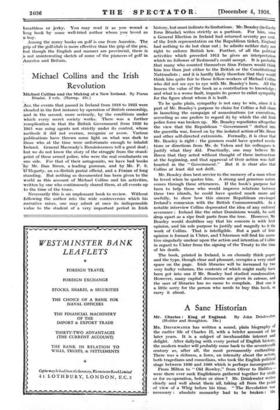Michael Collins and the Irish Revolution
'Michael Collins and the Making of a New Ireland. By Piaraa Beaslat. 2 vols. (Harrap. 428.)
ALL the events that passed in Ireland from 1916 to 1923 were clouded in the first instance by operation of British censorship, and in the second, more seriously, by the conditions under which every secret society works. There was a further complication in that the British Government from 1920 to 1921 was using agents not strictly under its control, whose Methods it did not oversee, recognize or avow. Various publications have thrown some light on what was dark to those who at the time were unfortunate enough to inhabit Ireland. General Macready's Reminiscences tell a good deal ; but we do not know the story of the struggle from the stand- point of these armed police, who were the real combatants on one side. For that of their antagonists, we have had books by Mr. Dan Breen, a leading gunman, and by Mr. P. S. 40'Hegarty, an ex-British postal official, and a Fenian of long standing. But nothing so documented has been given to the world as this account of Michael Collins and his activities, written by one who continuously shared them, at all events up to the time of the truce.
Necessarily this is an unpleasant book to review. Without 'following the author into the wide controversies which his ,narrative raises, one may admit at once its indispensable value to the student of a very important period in Irish
history, but must indicate its limitations. Mr. Beasley (in Cache form Beaslai) writes strictly as a partisan. For him, once a General Election in Ireland had returned seventy per cent. of the Irish representation on the Republican ticket, England had nothing to do but clear out ; he admits neither duty nor right to enforce British law. Further, of all the political activities which preceded 1913 he gives an interpretation which no follower of Redmond's could accept. It is probable that many who counted themselves Sinn Feiners would think him less than just either to the British or the Constitutional Nationalists ; and it is hardly likely therefore that they would think him quite fair to those fellow-workers of Michael Collins who did not see eye to eye with Mr. Beasley's hero. All this lessens the value of the book as a contribution to knowledge ; and what is a worse fault, impairs its power to enlist sympathy for the figure about whom it is built.
To be quite plain, sympathy is not easy to win, since it is part of Mr. Beasley's purpose to claim for Collins a full share in launching the campaign of assassinations (or executions, according as one prefers to regard it) by which the old Irish' police force was broken up. Mr. Beasley repudiates altogether the view that the Republican " Government " drifted into the guerrilla war, forced on by the isolated action of Mr. Breen and other self-directed extremists. Formally, it is clear that Mr. Beasley is right : the gunmen could have quoted resolu. tions 'or directions from Mr. de Valera and his colleagues to justify what they did. Practically, one may believe Mr. Breen that they acted without thought of these instructions at the beginning, and that approval of their action was half. hearted in the " Govermnent." But it is clear also that Collins at least did not drift.
Mr. Beasley does best service to the memory of a man whom he loved when he quotes him. A strong and generous nature comes thrOugh these utterances. If the book's purpose had been to help those who would improve relations betweal these two islands, he could have quoted much more and Usefully, to show. how this sincere Republican envisaged Ireland's connexion with the British Commonwealth. In i notable interview Collins deprecated the idea of any enforced severance : Ireland like the other Dominions. would, he said; drop apart as a ripe fruit parts from the tree. However, Mr. Beasley would doubtless say that his concern is with Irist opinion, and his sole purpose to justify and magnify to it tin work of Collins. That is intelligible. But a part of Irist opinion is formed in Ulster, and Ulstermen will find his liana. tive singularly unclear upon the action and intention of Collins in regard to Ulster from the signing of the Treaty to the time of his death.
The book, printed in Ireland, is on clumsily thick paper, and the type, though clear and pleasant, occupies a very small space on the page. Irish libraries will be increased by two very bulky volumes, the contents of which might really have been got into one if Mr. Beasley had studied condensation.
However, many capital documents are given in ealeriso, and•the user of libraries has no cause to complain. But one is
a little sorry for the person who needs to buy this book, or carry it about.






























































 Previous page
Previous page